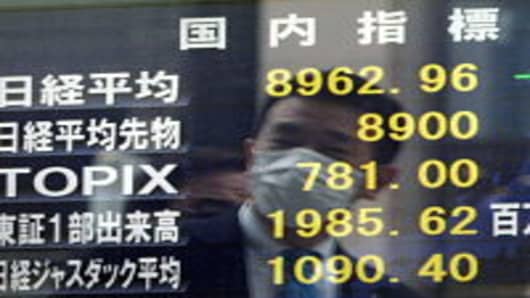The Bank of Japan needs to hold of market sentiment or risk the economy falling into a bigger-than-expected recession, according to Phillipe Gijsels of BNP Paribas Fortis Global Markets.
“It is so important that the central bank gets a grip on the situation, something it is currently, looking at markets, failing to do," Gijsels told CNBC Tuesday. "So, we can expect more extraordinary measures in the coming hours and days.”
“Equity markets in Tokyowere hammered overnight," he said. "We saw the worst declines since the 1987 crash. This clearly indicates that the Bank of Japan failed to stabilize sentiment.”
Having added 23 trillion yen ($28.2 billion) into the market over the last two days, the BoJ will be forced to add more cash to the system if stocks keep falling, he said.
“With what is currently on our plate we can expect the economy to lose 0.3 percent of growth in this and probably the next quarter," Gijsels added. "There is a serious disruption in the supply chain and the damage to the power generating capabilities of the country is hurting its economy.”
A disaster on this scale could normally be expected to take 0.2 to 0.5 percent off GDP for the next couple of quarters before rebounding when reconstruction starts, he said.
“This is if, and that is a big if, the Japanese authorities are able to avoid a recession," he said. "If stock markets continue to plunge and sentiment continues to tank we will get a negative wealth effect. This is exactly the opposite what the Fed tries to engineer.”
The wealth effect has been a big factor in the US following QE2 from the Fed and Gijsels said he is worried Japan could fail to achieve the same results.
“If in Japan people see the value of their assets and investments drop they will feel depressed and will be less willing to consume and invest," he said.
"If this continues for an extended period of time, it may be the catalyst for an overall fall in the economy or a recession.” There is little room to maneuver for the Japanese government given soaring debt levels, he added. “This once again teaches us that a system that is overloaded with debt is much more vulnerable to exogenous shocks and is less capable to do a self-healing process.”
“It is kind of ironic that we were looking for the catalyst that might derail the strongest risk on money flow in history," Gijsels said.
"There were troubles within the euro zone, rising oil and food prices and tensions in the Middle East. The events of the last couple of days once again teach us that it is still the arrow that comes from behind that is much more dangerous than all the bullets that come right at us," he said.



